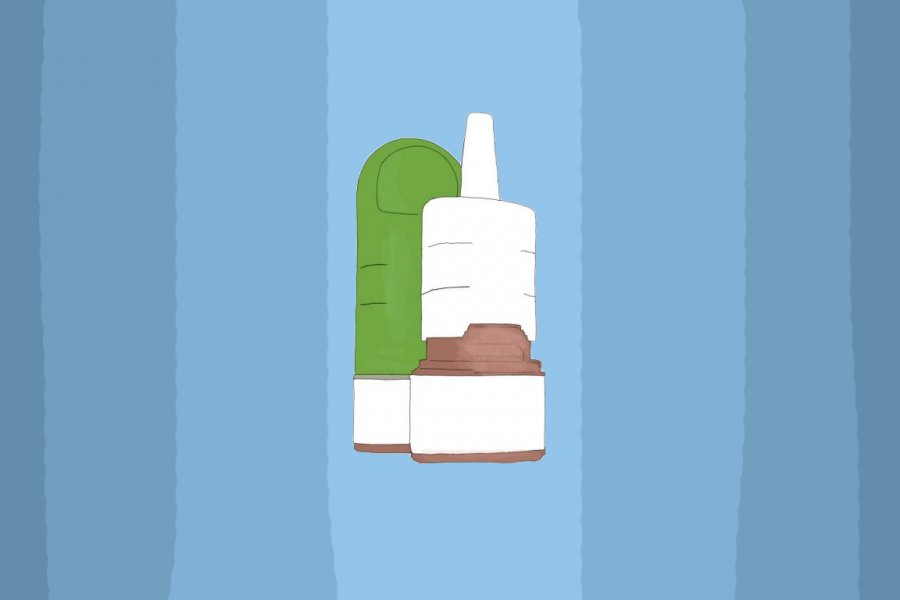My DNS dependency
May 21, 2020
When I was 10 years old, I developed an addiction to over-the-counter nasal decongestant sprays (DNS). It wasn’t until two months ago, over eight years later, that I overcame my addiction.
Now, you may tilt your head in confusion over what may seem like a rather odd substance to be addicted to. But it is actually “pretty common,” Dr. Neil Bhattcharyya, associate professor of otology and laryngology at Harvard and Brigham and Women’s Hospital, told The New York Times. In fact, he recalls that one out of every seven patients with sinus and nasal obstruction have abused nasal sprays, which can lead to compulsory cycles of overuse and dependence.
Granted, there is some debate over whether or not “addiction” is the correct word to use. It is important to understand that people who say they are addicted to DNSs do not feel the same kinds of psychological cravings that are a key characteristic of addictions. However, people who abuse DNSs often experience a physical drug dependence, needing higher doses with every use, suffer withdrawal symptoms, as well as believe they cannot live without it. This was exactly my experience.
It all started in the fourth grade when I got a severe sinus infection. Not only did I feel extreme pressure in my sinuses, but I could hardly breathe through my nose, especially when lying down. This might seem trivial, but with time it became beyond frustrating. After weeks of complaining about not being able to breathe, my father came home with a little bottle of Zicam Extreme Congestion Relief, and wow, did it work wonders. With just two sprays in each nostril I swear I could breathe better than ever before. It was a miracle.
One thing I neglected to pay attention to was the warning informing me that I was not to use it for more than three days. What was supposed to be three days quickly became four years. You might ask why my parents didn’t intervene. The truth of the matter was that they did; I was just beyond stubborn and very irritable. If I didn’t have Zicam, not only would I refuse to go to bed because I believed there was no way I could sleep without it, but I would throw violent tantrums, screaming and crying and flailing about. I threatened my parents that if I wasn’t sleeping, neither were they. And considering how high-pitched and annoying my voice was as a 10-year-old, it makes perfect sense to me why my dad would so often run to Safeway right before closing to buy me another bottle.
DNSs work by rapidly shrinking the blood vessels in your nose, clearing the passageway so that you can breathe better. In fact, DNSs are one of the fastest-acting drugs. What many people, like myself at the time, don’t know is that after those three days, they do the contrary by causing your blood vessels to swell even more. This is how one’s tolerance increases.
But how bad could overusing DNSs really be? The answer is really bad.
In the summer before my freshman year, I started seeing an allergist because I had been suffering from severe nosebleeds for about four or five months. It turned out that my nose had been so damaged by the abuse of Zicam that I needed to get surgery. In preparation, I had to abruptly quit using Zicam, which you might imagine didn’t work out well. It is fair to say that I didn’t really sleep during that summer. And as I mentioned previously, it wasn’t that I was suffering from cravings, but, oh man, the things I would have done during that summer to get my hands on Zicam!
After the procedure, it was a little easier to breathe and I hadn’t been using Zicam for roughly three months. Yet still, every night, I would lie awake thinking about how much easier it was to breathe, how much fresher the air was when I was using Zicam. It wasn’t until long that I began using Flonase, another DNS, though they claimed their products did not cause dependencies. So, it seemed like the perfect solution. Even my allergist said it would be okay.
But soon my dependence on Zicam shifted to Flonase and another three years of abuse. Flonase was definitely better for me though. The nosebleeds stopped, and if for whatever reason I didn’t have Flonase, I didn’t throw the same tantrums or suffer the same anxiety that I did when I was using Zicam.
Two months ago I came home from a trip and remembered I needed to pick up some more Flonase before I went to bed. I had just finished a bottle and was going to put it in a designated drawer that I used for empty Flonase bottles — please understand that the only reason I didn’t throw them away was because there were no recycling or disposal instructions and I figured that I would eventually solve it when the time came. Anyways, I saw then that the drawer was overflowing. I took all the bottles out and counted 91. Each bottle costs roughly $25. Before me I saw three years and $2,275 worth of abuse. I made the decision that this cycle had to end.
Just like that I stopped. And by “just like that” I mean countless sleepless nights, a few anxiety attacks, and a bunch of regret. It’s only now, after two months that I don’t think about Flonase most nights. My “nasal spray addiction” has always been kind of a joking matter whenever I discussed it. And I don’t want to paint myself as any kind of victim or compare myself to people suffering with severe drug addictions. But please be wary when you go to the store to buy a decongestant and read the warning label!




